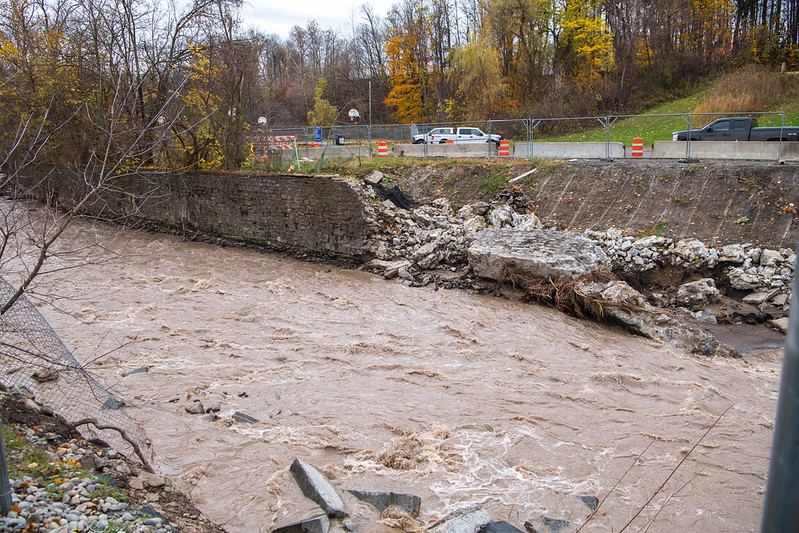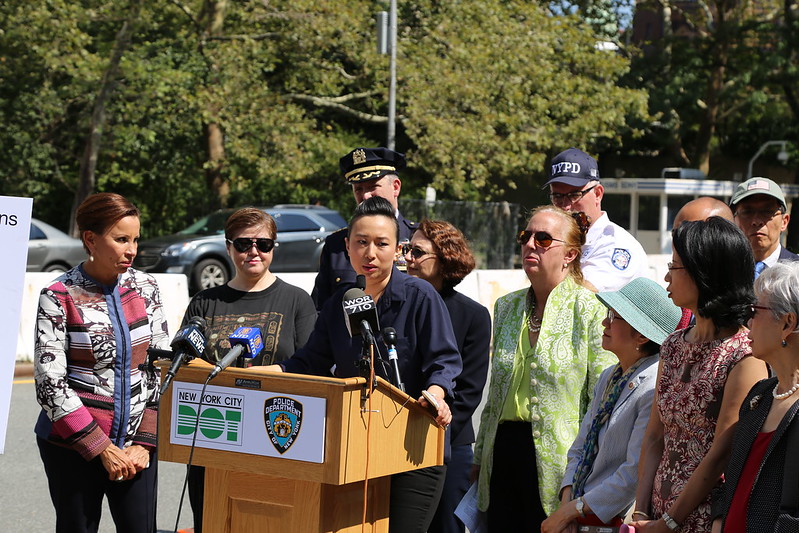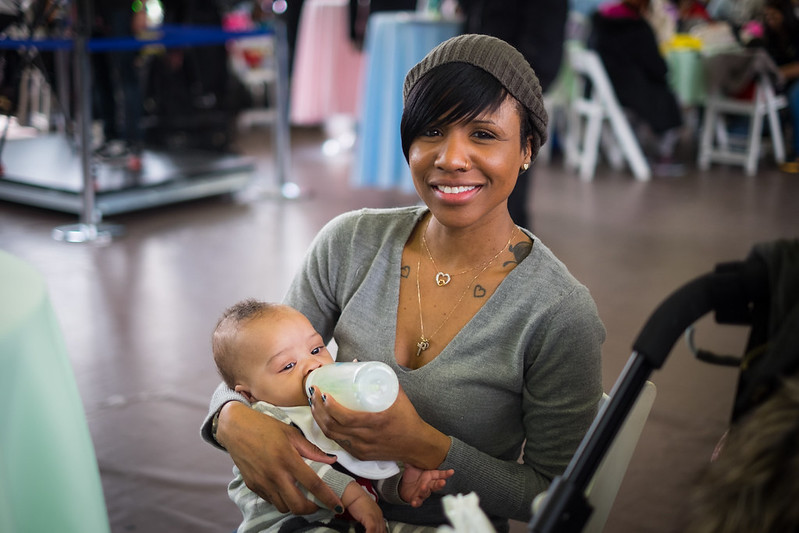It’s Time To Make Polluters Pay To Protect Our Climate Future

Climate change has many impacts (photo: governor's office)
Several weeks ago, when Hurricane Ida devastated New York, one thing became painfully clear: we are still not prepared for the climate crisis. At least 45 people were killed by the storm in the New York area, many of whom were low-income people of color, and the storm caused at least $50 million of physical damage to infrastructure and over 1,200 homes in our state alone.
This disaster happened in the midst of a fight raging in Congress about protecting the American public from the perennial threats posed by climate change. That fight continues right now in the form of the reconciliation bill pending before both houses of Congress. It is my firm belief that we cannot treat these disasters, which occur in every state, as isolated incidents: we need a comprehensive approach to ensure our infrastructure and communities are prepared and that resources for rebuilding are readily available when the next great climate-related disaster inevitably strikes.
To that end, I support the creation of a federal Polluters Pay Climate Fund, a bill that is currently part of the negotiations for upcoming reconciliation legislation in Congress but that needs our support to ensure it passes. We must persuade the Democratic leaders in Washington that this legislation is essential. While the necessary preparations for climate change must be spurred by the work of government, I do not believe that taxpayers should be solely responsible for funding it. Instead, we must look to the companies who have been profiting to the tune of billions of dollars each year from the fossil fuels that first caused, and every day exacerbate, the climate crisis.
A federal Polluters Pay Climate Fund would raise billions of dollars from polluting corporations to fund infrastructure and begin to mitigate the impact of the ever-worsening climate crisis we confront. In New York State, this funding would pay for us to build the physical infrastructure we need to fight disasters like Ida. Forty percent of the fund would go to communities disproportionately affected, which in New York would mean lifesaving efforts like fortifying our massive shoreline, weatherizing mass transit, repairing our antiquated drainage systems, and addressing our most dangerous flood zones.
The need for this funding is not theoretical; it is urgent. Recent research shows that at the current rate, our state will need to spend $10 billion annually to mitigate climate change impacts. Someone is going to pay for the costs of climate change: if it isn’t the polluters, it will continue to be the public. Currently, big polluters get to pollute for free while reaping enormous profits. I support a plan that makes them pay for the mess they’re making.
I recognize the importance of this fight because I have been involved in these battles for a long time. As a member of the New York City Council, I spearheaded the passage of a forward-thinking and comprehensive rewriting of New York City’s residential recycling program. As public advocate for the City of New York, a position that includes membership as a trustee on the city’s largest public pension fund, I led the push to divest New York City’s pensions from fossil fuels. Today, as the state’s attorney general, I have taken on the fossil fuel industry in court and continue to wage other critical environmental justice battles such as holding accountable those responsible for the contamination of PFAS, taking on – and winning against – the Trump administration’s EPA over smog pollution and “dirty power,” and assisting in the implementation of the Climate Leadership and Community Protection Act (CLCPA) here in New York, the most ambitious clean energy and climate law in the nation.
With every catastrophic natural disaster that occurs, the reality becomes more undeniable: we must do more to prepare for the next weather-related crisis and to prevent future ones. Simply cleaning up after the fact and hoping to avoid future disasters will only make matters worse. We must be proactive and forward thinking in our preparations and planning for our new climate reality.
To fund these endeavors, we cannot allow the companies responsible for the climate crisis – that have profited so much for so long – to avoid responsibility any longer. We have an opportunity in Congress to advance our climate preparedness while holding polluters accountable. Let’s let our leaders in Washington know that the Polluters Pay Climate Fund is the right solution at the right time. Our planet depends on it. Our country depends on it. Our future depends on it.
***
Letitia James is the New York State Attorney General. On Twitter @NewYorkStateAG.
***
Have an op-ed idea or submission for Gotham Gazette? Email This email address is being protected from spambots. You need JavaScript enabled to view it.
It's Time to End New York’s Abusive 'Poor Tax'

Assemblymember Yuh-Line Niou, the author (photo: NYC Department of Transportation)
Every day, our court system loads New Yorkers down with additional fees that further criminalize poverty while doing nothing to make us safer. In fact, these court fees are among the government’s most effective means of extracting money from New Yorkers most at risk of poverty and least able to bear the financial burden.
How much money are we talking about? Every single day, New York’s courts levy around $14,000 in regressive administrative surcharges, fees and fines, on top of the money people are already paying for whatever minor violation they are accused of. These fees add up quickly and devastate low-income individuals.
These nuisance fines and fees are not intended to make our state safer, they are simply a way for the state to take in more money. And they are vastly profitable, raking in millions every year from some of our state’s poorest residents who are struggling to make ends meet and lift themselves out of poverty.
This isn’t just a story of poverty, it’s directly tied to the structural and racial inequities in our court system. In my district, which includes Chinatown, New Yorkers who face language barriers often find themselves facing late fees for fines and penalties levied in a language they can’t understand. Those fines ripple through communities — $175 for a misdemeanor here, $95 for a speeding ticket there — and are one reason why immigrant communities like those in Lower Manhattan fear seeking legal remedies in our courts. For them, the city courthouse is a place best known for draining their bank accounts (if they are banked). In fact, according to the New York City Bar, a third of all surcharge revenue comes from violations of the Vehicle and Traffic Law, not including DWI violations. And no offense is too small to be padded with multiple, opaque fees.
No matter what your economic status, if you are called before the court for any of these minor infractions, you’re likely to leave the building with your pockets lighter and your sense of justice dented. For the wealthy, that’s an inconvenience and a story to tell over dinner. But for the poor, especially those raising small children or caring for elderly loved ones, those fees mean the difference between making rent and searching for a homeless shelter.
What possible justice is that?
These fines disproportionately hurt lower income people, and the effects can easily snowball into perverse mockeries of how our justice system should function. At a recent press conference hosted by the economic and racial justice coalition No Price on Justice, Brooklyn Defender Services Staff Attorney Dane M. Fioravante laid out the horrifying case of one individual trapped in a cycle of fines and fees that ended at Rikers Island.
As Fioravante explained, in 2019 “Mike” (not his real name) was fined $200 for driving on a suspended driver’s license. Over the last two years Mike, like so many others, has worked hard to make ends meet. Unable to pay that fine, Mike found himself trapped in a debt cycle that ensnares too many New Yorkers. Earlier this year, police raided Mike’s home on Staten Island, terrifying his family and young child. What violent crime could have justified a full-on nighttime raid? Failure to pay his $200 civil fine during a pandemic that devastated low income communities.
Mike was moved from holding cell to holding cell, first on Staten Island and then in Brooklyn, where he waited until the next morning to see a judge. Still unable to pay his fee, Mike wound up on Rikers Island, one of our nation’s most violent institutions, all for a single suspended license infraction and the fees that came with it. Mike’s nightmare stay in the Rikers intake area would spiral into a four-day ordeal that unfolded in the midst of the jail’s ongoing humanitarian crisis. Our distorted fines and fees regime has turned Rikers into a debtor’s prison, and criminalized poverty on a scale that should disgust anyone interested in proportional and equal justice.
We’re making real progress in Albany toward limiting the scope of these extortionate fines and fees, but we must act faster and more broadly to correct this systemic injustice. Sometimes the slowdowns are unintentional, like when other criminal justice reform bills took priority. In other cases, right-wing media outlets pumping up a bogus “crime surge” narrative have actively scared lawmakers away from addressing issues like nuisance fees. But trapping low-income people in an endless cycle of debt and incarceration will never reduce crime or make our communities safer and may well have the opposite effect.
Fortunately, some elements of fine and fee reform are already improving the lives of New Yorkers. The Driver’s License Suspension Reform Act went into effect on June 29, ending driver’s license suspensions for unpaid traffic tickets. Even better, the measure allows New Yorkers with unpaid traffic tickets to set up payment plans that get them right with the law without destroying their financial stability or means of getting to and from work and taking other essential trips. No one’s life is made more stable by taking away their means of earning an honest living.
That’s a good start, but New Yorkers deserve better. That’s why I’ve partnered with my colleague, State Senator Julia Salazar, to introduce the End Predatory Court Fees Act prohibiting mandatory minimum fines for penal law and traffic offenses. In addition, our legislation also tackles probation and parole surcharges, a cruel set of fees that almost exclusively punish low-income people unable to pay for their freedom even though they are otherwise eligible for a termination of sentence.
Our legislation would finally end the inequitable financial burdens placed on defendants by statutory provisions that pad New York’s public finances with complete disregard to how they undermine our communities and public trust in our judicial system. We do this by empowering the courts to significantly reduce or eliminate outright many of the onerous fees New Yorkers have grown to hate. In its place, we must focus on policies that actually yield positive outcomes for our residents and our state. The exploitative fees that fill up our courtrooms only make that job harder.
New York can get serious about building a justice system that strengthens our communities instead of siphoning off their hard-earned money through administrative trickery. By reforming our courts to be free from the profit incentive, we can guarantee better representation and more productive outcomes for all.
***
Assemblymember Yuh-Line Niou represents New York’s 65th Assembly District, including Lower Manhattan and Chinatown. On Twitter @yuhline.
***
Have an op-ed idea or submission for Gotham Gazette? Email This email address is being protected from spambots. You need JavaScript enabled to view it.
Pregnant People Need a Green New Deal

A new mom (photo: Edwin J Torres/Mayor's Office)
While the media has started to connect heat-related deaths to climate change over the past few years, one particularly vulnerable group is too rarely discussed in reporting and not reflected in policy: pregnant people and newborns. As the climate crisis gets worse, we need policies to prevent dangerous outcomes and to undo vast inequities in pregnancy.
After centuries of disenfranchisement, many pregnant people of color living in New York City sit at the intersection of systemic racism, health inequity, and the dangers of our already warming planet.
The body’s ability to regulate temperature is compromised during pregnancy, meaning that increasing temperatures caused by climate change pose a particular risk to pregnant people. This is especially true in New York City, where maternal mortality rates and increased heat from climate change are high and experienced unequally.
In areas of the city that are already hotter on average because of the urban heat island effect, like the South Bronx and Harlem, the impact of increased heat can be especially harmful. Due to a long history of racism, disinvestment, and environmental injustice, many of these hotter neighborhoods are home to majority people of color.
In addition to exacerbating these inequities in heat, climate change worsens pre-existing health risks related to birth outcomes. Black women in New York City are also up to 12 times more likely to die from pregnancy-related causes than their white counterparts. Increased heat has been connected to both preterm birth and low birth weight, and Black women living in the Bronx already experience higher rates of both.
Despite the linkage between heat and pregnancy outcomes, pregnant people are largely kept out of discussions about those vulnerable to heat. What’s more, health providers don’t always share the risks of heat with their pregnant patients. Even if they do, there aren’t many options for reducing heat exposure at an individual level. Air conditioners are expensive, often prohibitively so, as are electric bills. Public housing buildings are often older and hold more heat. Employers aren’t required to offer cooling options and many jobs require long-term exposure to high heat levels that are impossible for workers to avoid.
This is a huge, multifaceted issue, but luckily, there are things we can do about it.
For everyone to have the healthy pregnancies they deserve, our leaders must ensure that all people are set up well to withstand the heat and access the care they need. In addition to more general climate responses, we must pay specific attention to pregnancy-related heat issues. We need policies that provide funding for healthcare worker training on the issue, further research on climate change and pregnancy, improved breathability conditions in NYCHA buildings, better protections for pregnant people on the job, and better access to air conditioning for low-income families.
As the climate crisis worsens, pregnancy-related outcomes will get worse with it. The difference between acting effectively and not will be measured by the life and well-being of future generations.
***
Isabel Levey-Swain is a graduate student at CUNY School of Public Health. She has worked and researched at the intersection of gender and health equity for several years.
***
Have an op-ed idea or submission for Gotham Gazette? Email This email address is being protected from spambots. You need JavaScript enabled to view it.




